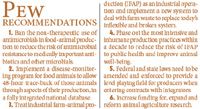Pew industrial farm report
Washington - A report exploring big agriculture's impact on the environment, animal welfare and human health is encountering strong criticism from a faction of leaders in veterinary medicine.
Washington — A report exploring big agriculture's impact on the environment, animal welfare and human health is encountering strong criticism from a faction of leaders in veterinary medicine.

Pew recommendations
The 2.5-year, $3 million study, released by the Pew Commission on Industrial Farm Animal Production, is being publicized as the nation's first in-depth, comprehensive review of U.S. agriculture practices. Yet organized veterinary medicine, known to tout the reputation of Pew Charitable Trusts, now opposes at least two of the six Pew recommendations, including phasing out sow gestation stalls and battery cages and banning the non-therapeutic use of antimicrobials in animals entering the human food chain.
Those proposals are mobilizing producer and veterinarian detractors who claim the report comes from a panel overly influenced by its partner and initiator, Johns Hopkins University's Bloomberg School of Public Health.
"Johns Hopkins is very much anti-large-animal agriculture and has been very active in opposing industrial agriculture for years," contends Dr. Gatz Riddell, executive vice president of the American Association of Bovine Practitioners. Dr. Tom Burkgren, executive director of the American Association of Swine Veterinarians, concurs: "I think they had a report written before they ever convened a commission. We agree with the recommendation to increase funding for agriculture research. The rest are taken from the anti-agriculture activists' playbook."
Supporters say the attack insults the integrity of the panelists, who include some of the most respected names in human and veterinary medicine.
Still, the report's findings are so controversial even the American Veterinary Medical Association (AVMA) would respond to questions only in writing. Dr. Lyle Vogel, assistant executive vice president, writes that the Pew report and its related research documents fail to provide "solid facts" concerning the extent of human antimicrobial resistance associated with uses in animals.
Commission panelist Dr. Michael Blackwell, former U.S. Assistant Surgeon General and retired veterinary college dean at the University of Tennessee, cites a need to take antimicobials out of the hands of producers.
"Lay people should not be able to go to the co-op and buy drugs to put into the food supply. ... It is my hope that veterinarians will become more involved in this sector," Blackwell says.
Dr. Gail Golab, AVMA animal-welfare director, counters the claim that systems like sow gestation stalls and battery cages are health risks, saying they "provide some welfare advantages over extensive systems. ... This recommendation doesn't guarantee improvements in animal welfare or disease control. In fact, there is a real possibility both could be made worse."